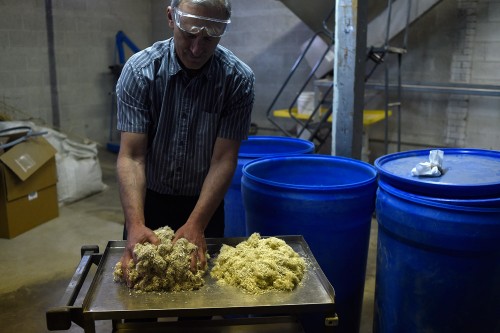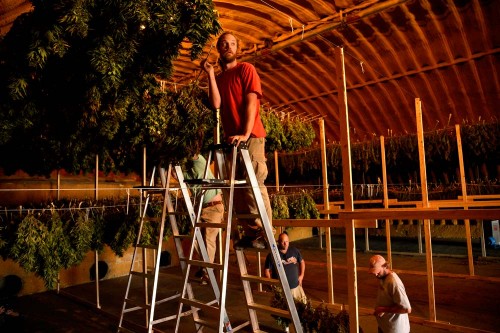Welcome to our Ask The Cannabist column. Clearly you have questions about marijuana, be it a legal concern, a health curiosity, a Colorado-centric inquiry or something more far-reaching. Check out our expansive, 100-question Colorado marijuana FAQ first, and if you’re still curious, email your question to Ask The Cannabist at askthecannabist@gmail.com.
Hey, Cannabist!
Is CBD oil legal in states with medical marijuana laws? –Cannabidiol Curious
Hey, Cannabidiol Curious!
CBD, or cannabidiol, is a non-psychoactive compound in cannabis believed to have significant medicinal properties. The legality of CBD is complicated because the market and demand for CBD is relatively new and has been developing in a grey area of law.
CBD products can come from marijuana plants bred with higher CBD-to-THC ratios. CBD products can also be made from industrial hemp plants. With different laws governing marijuana and hemp plants, the legality of CBD products gets confusing.
There are many ways to interpret the current laws. I asked Robert Hoban, an attorney who specializes in business and regulatory compliance for marijuana and hemp, for his analysis of the legality of CBD products.
First, let’s get some clarification on the legal definition of hemp. Hemp is already legal! Hoban shares more detail via email: “Industrial hemp, which is properly sourced (currently this mean imported stalks, fibers, hurd) and assuming it is limited to these above-referenced parts of the plant, are lawful under federal law. This is fact no matter whether the individual state has CBD/medical marijuana laws, or not.”
Hurd, if you are not familiar, is the inner part of the hemp stalk. Sterilized hemp seeds are also legal, says Hoban. However, viable seeds require a federal seed importation permit. Basically, properly sourced hemp is federally lawful.

In terms of THC content, even the non-intoxicating amounts in hemp, a federal definition for that passed into law last year in the Agricultural Act of 2014. Hoban elaborates: “Yes, the definition of industrial hemp is defined by THC content as follows: [T]he plant Cannabis sativa L. and any part of such plant, whether growing or not, with a delta-9 tetrahydrocannabinol concentration of not more than 0.3 percent on a dry weight basis.”
Now, let’s examine another primary source for federal cannabis law, the Controlled Substances Act (CSA). Hoban points out a passage in the CSA that defines industrial hemp products as exempt from the definition of marijuana. The definition of “marijuana” expressly and intentionally excludes:
“[T]he mature stalks of such plant, fiber produced from such stalks, oil or cake made from the seeds of such plant, any other compound, manufacture, salt, derivative, mixture, or preparation of such mature stalks (except the resin extracted therefrom), fiber, oil, or cake, or the sterilized seed of such plant which is incapable of germination.”
From this we can summarize that the industrial varieties and derived products are legally different from marijuana. Even though hemp is not defined as a controlled substance, the CSA has affected U.S. hemp agriculture in a different way.
“Strictly speaking, the Controlled Substances Act does not make growing hemp illegal, but rather, it places strict controls on its production,” Hoban says.
More on CBD
NEW: Get podcasts of The Cannabist Show.
Subscribe to our newsletter here.
Watch The Cannabist Show.
Case law further clarifies the definition of cannabinoids, like the compounds THC and CBD, in hemp. Hoban explains the significance of the 2004 ruling by the U.S. Ninth Circuit Court of Appeals in Hemp Industries Association USA LLC v. Drug Enforcement Administration.
“Naturally occurring cannabinoids in industrial hemp foods, including oil, were never scheduled under the CSA; therefore, the DEA has no jurisdiction,” Hoban says.
This court decision means, according to Hoban: “THC occurring in stalks, fibers and hurd is not defined as marijuana and therefore does not come from marijuana and is therefore legal, as set forth in the 2004 HIA case.”
When made from hemp, CBD products are legal in any state, regardless of medical marijuana laws, because federally, agricultural hemp, manufactured hemp products or naturally derived cannabinoids are not defined as a controlled substance.
The DEA has oversight over THC, but the scope is narrow, Hoban says. “The DEA can regulate products containing natural THC if it is contained within “marijuana,” and can regulate synthetic THC of any kind. But it cannot regulate naturally-occurring THC not contained within or derived from “marijuana,” i.e., non-psychoactive hemp products, because non-psychoactive hemp from the stalks and fibers of such a plant are not included in Schedule I.”
To sum up, the DEA regulates THC in marijuana and synthetic THC, but it does not regulate the THC content in hemp.
So, if hemp and derived hemp products are already federally legal, why have several states passed laws allowing only use of CBD oil? There is obvious confusion regarding the legality of the new hemp products.
In Hoban’s opinion, “It is more of a policy statement than anything else. I find it unnecessary, but these states are trying to make a point. Plus, this applies only to imported hemp to date because domestic hemp production is subject to a whole other complex legal analysis.”
All right, then. So this applies to imported hemp and not necessarily to at least 22 states that have their own industrial hemp laws. No wonder CBD legality can be confusing!

Since the DEA does not have jurisdiction over naturally occurring cannabinoids in hemp, a federal agency has to have oversight of CBD products. Hoban explains: “The FDA (Food and Drug Administration) and the FTC (Federal Trade Commission) have increasing control over these products and recently exercised this power, when the FDA indicated that CBD cannot be marketed and sold as a dietary supplement (which it had been for years now).
“This flexing of the muscle has cooled the progress in the industry and was certainly calculated; this flexing has occurred through various claim/reps letters and the recent Q&A regarding dietary supplements. But it deals more with various producers seeking (and obtaining) various forms of new drug status for CBD pharma versus the legality of the plant/product. In fact, the FDA has stayed away from illegality concerns in their entirety thus far.”
Although the FDA has not questioned the legality of CBD products, with this recent announcement, CBD products cannot be sold as a dietary supplement.
Also this year, the FDA issued warning letters to certain companies that market CBD products. In the announcement, the FDA said the products are not approved for the diagnosis, treatment or prevention of diseases. Additionally, the products available online were tested for potency, and many did not contain the amount of CBD listed on the label.
I hope this information is enlightening. If you’re still confused or have more questions, it’s understandable, this is a complex area in cannabis today. XO
